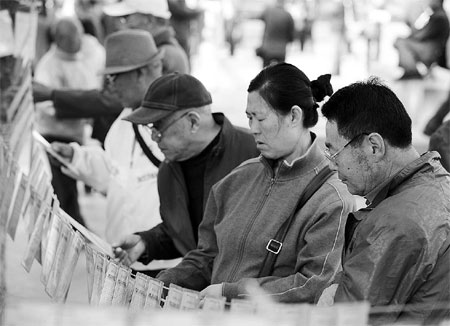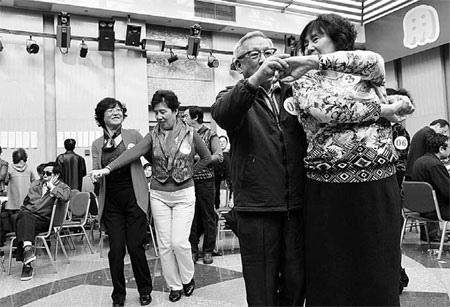Seniors share love without marriage
By Zhou Wenting ( China Daily )
Updated: 2013-11-15
|
|||||||||
Many older people cohabit because of family pressures, Zhou Wenting reports in Shanghai.
Onlookers could be forgiven for thinking that Ni Xinhong and Shen Huijuan are a married couple.
The divorcees, who met in August 2010 and began living together three months later, alternating between homes because they felt they had "clicked", have been inseparable for the past three years and do everything as a couple.
However, family, not social, pressures mean they have shied away from marrying.
"The objections from the children on both sides were overwhelming. So we finally compromised by moving in together, but keeping our finances separate," said Ni, a 63-year-old retiree from Shanghai.
Once, such a move would have been unthinkable, but there has been a sea change in social customs, according to sociologists who say the public has given tacit consent to cohabitation as a form of second marriage.
Against the backdrop of China's rising divorce rate, Ni and Shen, 55, were among the thousands of middle-aged and senior lonely hearts seeking love.
Official data show that during the past seven years China's divorce rate has risen by 8 percent annually. In 2012, more than 3 million couples filed for divorce, while about 13 million took the plunge, according to the Ministry of Civil Affairs.
Today, approximately 80 percent of Chinese seniors seeking a permanent partner say they would opt to cohabit rather than marry, according to matchmaking agencies, who said the move is usually prompted by pure pragmatism.
"The intention of the majority of those without (marriage) registration is to prevent future problems, such as the division of property after death. The soaring price of housing in recent years has seen property wrangles become the main source of complaints from the younger generation," said Zhou Huiming, a legal advisor with the Shanghai Retired Employees Administration Committee under the Shanghai Federation of Trade Unions.
However, some experts have warned that these "unregulated" relationships may trigger problems, partly because they aren't covered by Chinese law and partly because of the fear that social stability may be eroded if cohabitation becomes the prevailing norm.
Demographic changes
Second marriages and cohabitation are also the results of changing demographics, especially China's aging society, according to Zhou. "Single retirees feel they can't rely on the government to provide for their old age, so they're finding their own ways of solving the problem, including second marriages and cohabitation," he said.
Ni said he and Shen considered getting married, but his sons were strongly opposed. "My eldest son, who works in Beijing, rushed home to stop me from getting married."
"They said it's fine if you want to keep each other company and we don't mind if you want to live at her place or she comes to live with you. The only non-negotiable thing is getting married," he said.
Ni and Shen live a life indistinguishable from that of any married couple, but without a certificate. They are both happy with their situation, which, they say, was inspired by other people's failed second marriages.
"A friend of mine remarried. She sold her apartment and moved in with her new husband, but they divorced after six months because the husband's children quarreled with her every day. She had to look for a new home," said Shen.
She said her relationship with Ni leaves plenty of freedom for both partners. "Without a certificate, we can have an easy ending if the relationship turns bitter some day."
However, she admitted that sometimes she can't ignore the feeling of not being respected by Ni's children.
"His sons often look at me as though I've taken advantage of their family and their father has given me everything valuable that their mother left," said Shen.
She said the young people simply don't understand that they are taking care of each other because their children work far away from their home city.

Cohabitation conundrum
Shanghai Silver Hair Matchmaking Agency, one of Shanghai's most-popular introduction services for the middle-aged and elderly, receives around 200 people seeking new relationships every week. However, last year only 50 percent of the couples they introduced actually married, while the rest chose to cohabitate.
Many couples do live happily after a second marriage, according to Qiao Xiaojie, a retired teacher who has been a voluntary matchmaker for five years.
"I know two retired professors, both in their 60s, who tied the knot four years ago after I introduced them. They have similar hobbies and interests and have great patience with each other," she said. "Their marriage is working so well that a matchmaking agency recently invited them to share their experiences with other love seekers."
Gu Liping, Shanghai Silver Hair's director, said cohabitation appears a good option when both partners are in good health and economically equal, because it solves the problem of loneliness for senior singles. Houses and property rarely enter the equation.
However, conflict may arise if one of the partners falls ill. "The healthy partner may end the relationship without a word," she said.
She recounted a case she encountered last year; when the male partner died, the female, who had been with him for seven years and had provided financial support, was driven away by his children almost immediately.
Cohabitation may seem to protect property on both sides, but the lack of legal coverage means it actually provides few safeguards, said Shu Xin, head of the China Marriage and Family Counseling Center.
"A marriage is not only based on shared finances, but also on commitment and a sense of security. Otherwise, suspicion, lack of trust and a higher likelihood of affairs outside the relationship can bring harm," he said.
Although society seems happy to accept seniors cohabiting, younger people are not treated with the same leniency. There are concerns about unmarried young mothers and a dismissive attitude toward marriage that could wield an adverse influence, at least on the children of such partnerships, said Zhou Xiaopeng, a marriage and relationship counselor with Baihe, a major dating website.
"Their children will think cohabiting is the solution if marital problems cannot be addressed. But for older people, a loving relationship with sexual relations is fine. The partners can wave goodbye freely if it turns sour," she said.
However, Zhou said the seniors shouldn't blame their children if they object, because they are often to blame for ramping up an atmosphere of distrust unnecessarily. "If they fear financial disputes, they can be solved by premarital property notarization or negotiations."
New difficulties
Prospective senior partners were able to size each other up at a matchmaking event held in Shanghai from Nov 9 to 11. The event attracted 40,000 visitors after the age bar was raised to 60 from 35, the upper limit at an event in May, which drew 32,000.
Around 50 middle-aged people and seniors squeezed themselves into a 15-square-meter room. They scanned the information about other singles in the same age group that had been posted on the walls and copied it into their notebooks.
"I hope God will send me an ideal husband," said Sun Liqing, a 58-year-old from Wenzhou in Zhejiang province, smartly decked out in a velvet dress and pearl necklace. She had traveled to Shanghai especially to attend the event.
Sun said she doesn't have any specific requirements for a future spouse, except that men without children from their previous marriage are automatically excluded from consideration.
"Nobody was DINK (double income, no kids) three decades ago, so he might have a very weird personality if he refused to have a child back then," she said.
However, experts warned that those seeking a new life partner can't afford to be too choosy. A mere 10 percent of people aged older than 50 find a satisfactory new partner after a divorce or the loss of their spouse, according to statistics from the Gerontological Society of Shaanxi province.
Women, especially those aged 60 and older, had better abandon their high expectations for a future husband, because men always want a younger woman to revive their vigor and provide care, according to one insider.
"Men in their 30s may want their wife to be around three years younger than them, but men in their 70s usually prefer a spouse 10 years younger," said Qiao.
Moreover, despite the low rate of second marriages, many of those looking for a partner refuse to lower their expectations. Some will not choose a partner with a son in case he claims the apartment as a wedding gift, in accordance with the Chinese tradition that the bridegroom's family should provide a residence for the newlyweds. Others refuse to countenance a partner with a daughter because they believe some girls are oversensitive and won't accept them.
"I wouldn't consider anyone with a long marriage history," said Wu Chengjun, 63, whose wife died 15 years ago.
"Divorced women often have a more complicated way of thinking; they may have suffered domestic violence at the hands of their ex-husband, or been exposed to other bad habits such as whoring or indulging in alcohol, which could cast a shadow over a second marriage," said Wu, who has been looking for a partner since he retired from an aviation research institute in Shanghai three years ago.
Wu was approached at the event by a 59-year-old woman surnamed Liu, but she walked away after discovering that he has been a smoker for more than four decades.
"I began smoking at 18 and cannot quit. Anyway, I'm looking for a wife not a stepmother who wants to fix me from head to toe," said Wu.
His explanation cut no ice with Liu: "Nobody in my family smokes or drinks. My parents and children are teachers and I don't think they would get along with him very well."
High failure rate
There is also a high failure rate for second marriages, according to data from the courts.
In the past five years, nearly 70 percent of those aged 60 and older who remarried have divorced, according to Shanghai Jing'an district People's Court.
The divorce rate of the remarried group is 15 to 50 percent higher than for first marriages, according to data from the courts in Lixia and Shizhong districts and Pingyin county in Jinan city, Shandong province, which have been reviewing all the divorce cases in their districts during the past two years.
Wu said that his experience of blind dates has taught him that the high divorce rate is understandable.
"Some people's intentions are not pure; they just want romance and to travel around the world. A marriage based on those premises will undoubtedly fall apart," he said.
Part of the reason for the higher divorce rate among remarried couples is that they fail to consider the potential harm to their children, according to marital and family affairs experts, who pointed out that a second marriage is often radically different to the first.
"Those who remarry don't share a common background of growing up together as a young couple, who usually have a beautiful common vision of establishing a family and making plans for their children," said Shu.
"Seniors often have a private plan in their hearts when it comes to remarriage."
Contact the author at zhouwenting@chinadaily.com.cn
|
Seniors read information posted at a matchmaking party in Qingdao, Shandong province. The party attracted more than 2,000 people who were looking for partners. Zhang Lei / for China Daily |
|
More than 100 people, many aged 60 or older, take part in a matchmaking party in Beijing in autumn 2012. Xinhua |
(China Daily 11/15/2013 page5)





